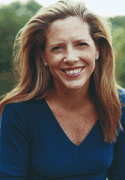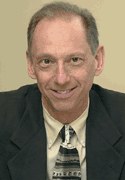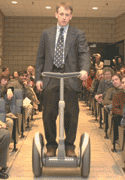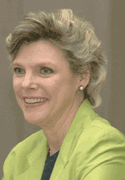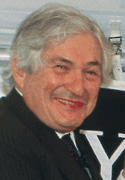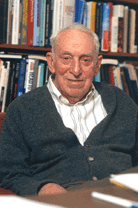
 |
||
The Yale Alumni Magazine is owned and operated by Yale Alumni Publications, Inc., a nonprofit corporation independent of Yale University. The content of the magazine and its website is the responsibility of the editors and does not necessarily reflect the views of Yale or its officers. |
At a February 25 Pierson College master’s tea to kick off Eating Disorders Awareness Week, Self magazine editor Lucy Danziger told students about her publication’s efforts to counter the fashion-magazine image of “morose, skinny, deprived models.” Danziger said women are too focused on weight. “You can run every day, but you’re still not going to look like Gwyneth Paltrow,” she said. “You should go for a run not because you don’t want to get fat, but because it makes you feel good.”
Former psychology department chairman Alan Kazdin has been appointed director of the Yale Child Study Center, where he has held a joint appointment since he came to Yale in 1989. School of Medicine dean David Kessler called Kazdin “one of the country’s foremost authorities on childhood disorders and their diagnosis, assessment, and treatment.” Kazdin, who also directs the Yale Child Conduct Clinic, oversaw an expansion of the psychology department during his 1997–2000 chairmanship. He succeeds Donald Cohen, who died last year.
John Morrell '86, one of the engineers behind the Segway Human Transporter, showed off the product in a lecture at Davies Auditorium on March 5. Morrell said he looks for “smart and lazy” people for his engineering team, “because they are constantly trying to figure out how to spend the least amount of effort to get to the answer.” Morrell’s lecture was part of a series celebrating the sesquicentennial of Yale engineering.
Speaking to a large crowd at St. Thomas More Catholic Chapel on April 8, broadcast journalist Cokie Roberts said that it won’t be easy for women to become Catholic priests. “Nobody relinquishes power,” said Roberts, who is a practicing Catholic. “You have to grab it and fight like the devil for it.” Roberts said she was “appalled” by the involvement of Catholic bishops in covering up cases of sexual abuse involving priests, but she also criticized the way the media cover religion—focusing, she said, more on scandal than faith.
David Sedaris, NPR commentator and author of Me Talk Pretty One Day, launched his spring tour in Woolsey Hall on April 2, delighting the audience with new stories about a perennial topic—his comically dysfunctional family. In a yarn involving his brother’s near drowning, Sedaris tries to summon up skills learned in water safety class. Instead, he recalls the god-like lifeguard asking for resuscitation volunteers, and himself, as a boy, secretly hoping, “Choose me!” But, as Sedaris said, “These are not the sort of memories that save lives.”
On April 3, World Bank president James Wolfensohn gave the inaugural address for the School of Management’s International Institute for Corporate Governance. “I’m grateful you’re not burning me in effigy,” said Wolfensohn, whose organization has been the target of antiglobalization protests. A better system of governance is “an essential element in achieving a more equitable distribution of income in the developing world. Where there’s neither hope nor opportunity, people of ill will can flourish.” Close-Up “Don’t put all your eggs in one basket.” So said Sterling Professor of Economics James Tobin when he won the Nobel Prize in 1981, using a well-worn cliché to explain his “portfolio theory” of financial markets to a reporter. But Tobin, who died from a stroke on March 11 at the age of 84, did far more in his career than confirm the folk wisdom of his native Illinois. Tobin helped bring Keynesian economics into full flower in the United States, advanced the discipline’s understanding of how investors assess risk, and served as a committed teacher and citizen of Yale.
Tobin earned his bachelor’s degree and PhD from Harvard and served as a Naval Officer in World War II before coming to Yale in 1950 as an associate professor. Within seven years, and before he was 40, he had achieved the rank of Sterling Professor. Tobin’s influence was felt in the early 1960s when he served on president John F. Kennedy’s Council of Economic Advisers, which crafted the tax cut strategy that led to the 1960s economic boom. His idea for a tax on international currency transactions has been adopted recently by opponents of economic globalization—much to Tobin’s chagrin, as he was a supporter of free trade. Tobin, who retired in 1988, lived in New Haven. He is survived by his wife Elizabeth and four children. |
||||||||||||||||
|
|
|
|
|
|
|
|
©1992–2012, Yale Alumni Publications, Inc. All rights reserved. Yale Alumni Magazine, P.O. Box 1905, New Haven, CT 06509-1905, USA. yam@yale.edu |
||
